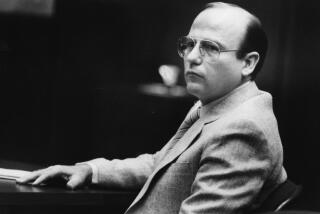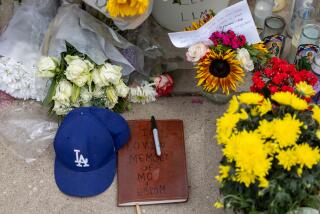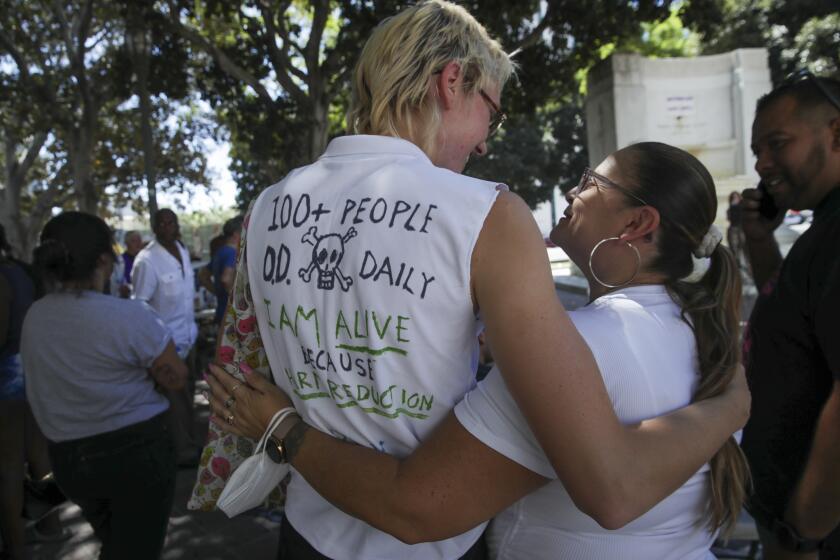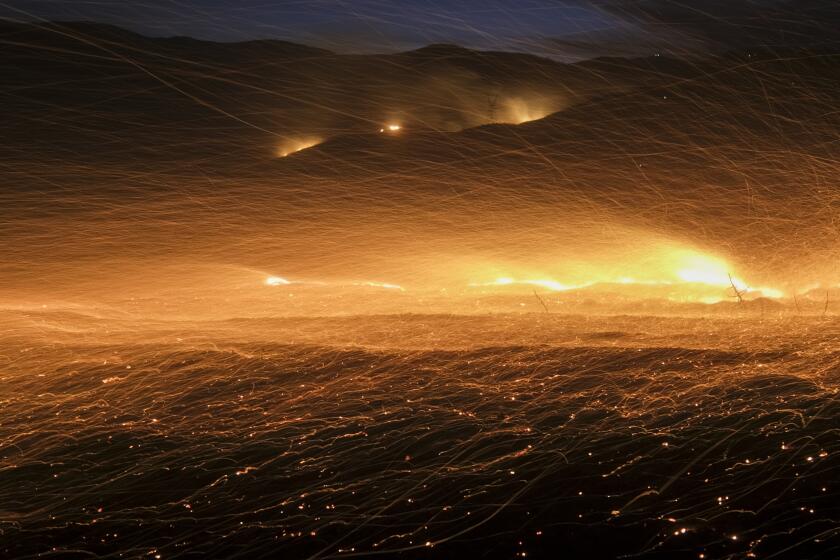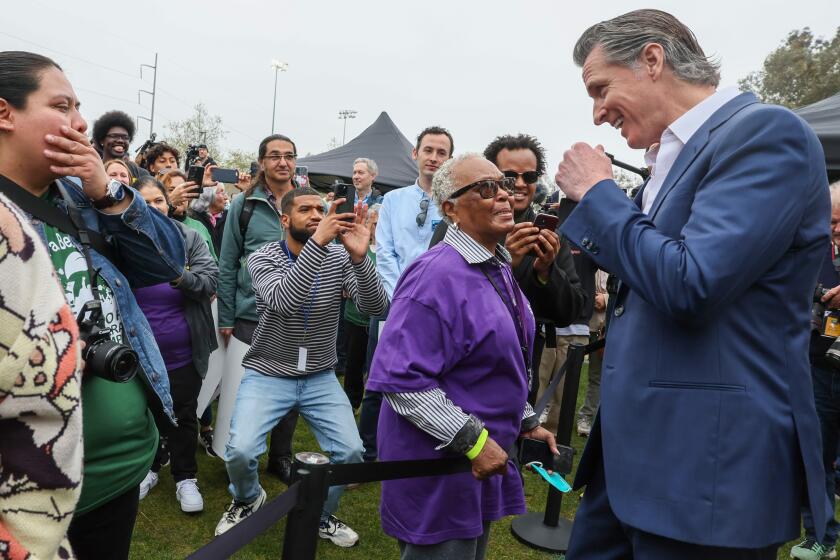LAPD’s Readiness to Reform Will Be Put to Test With Decree
With its acceptance of a federal consent decree Tuesday, the Los Angeles City Council committed itself to the latest and strongest attempt to bring the Los Angeles Police Department under the firm grip of civilian control.
Proponents hope that this time it takes. History argues for caution in declaring that struggle complete.
“I think the consent decree was inevitable,” said Lou Cannon, author of “Official Negligence,” a history of the LAPD. “But I don’t think it’s a panacea.”
As many observers note, that is true in part because the LAPD over the years has proved extraordinarily resourceful in resisting reforms--sometimes bending in one direction only to snap back once the uproar subsides.
How this particular episode concludes depends on whether that history repeats itself, with the LAPD digging in and its leaders avoiding or confronting their civilian bosses. If it does, this effort could produce temporary results or none at all. But if the LAPD’s civilian Police Commission uses the power it has been given--and if the LAPD management concludes that it will embrace this program for reform, either because it wants to or because it sees no other option--significant change could at last come to a department that has shrugged it off before.
Changes Were Often Short-Lived
Take, for instance, the aftermath of the 1965 riots in Watts.
When the McCone Commission leaned on the department and other social institutions after those riots, there was short-term evidence of change. Police Chief Tom Reddin expanded the department’s community relations efforts 25-fold. His successor, Police Chief Ed Davis, invented Neighborhood Watch and the Basic Car Plan, precursors to what is known today as community-based policing.
But in 1978, when Daryl F. Gates took command of the department, those reforms were dramatically scaled back, partly the result of Proposition 13-related budget cuts, partly out of philosophical and managerial differences.
By the end of the 1980s, the LAPD, undeterred by a civilian Police Commission that was understaffed and sometimes inattentive, had drifted far from the notion of a community-based organization. It was widely perceived, particularly in minority communities, as something of an occupying army, the exact opposite of the vision suggested by the McCone Commission.
In 1991, those tensions erupted over the beating of Rodney G. King, which gave the impetus to the landmark recommendations of a new commission chaired by Warren M. Christopher. Some of those recommendations were enacted by voters, but even in the face of an outraged public and political leadership, other recommendations quietly languished.
One telling example: Christopher and his colleagues, noting the LAPD’s disturbing inability to spot trouble in its own ranks, recommended improved systems for tracking problem police officers. The LAPD never publicly opposed that suggestion. Indeed, Police Chief Willie L. Williams strongly voiced support for the Christopher Commission reforms until his final day in office. Nevertheless, year after year, the department declined to request the money to install such a system.
The Police Commission eventually dug into its own paltry bank account to pay for the first stages of a computerized tracking system known as TEAMS. Later, when the federal government demanded an upgrade of that system and even offered to help pay for it, the improvements sat on the drawing board while the city bureaucracy dithered. There is, however, a striking difference between those attempts at reform and the one that the council gave conceptual approval to on Tuesday.
In those instances, the reform packages relied on the electorate and the political leadership of the city to give them force. This time, a monitor and a federal judge will decide whether the department is living up to its commitments. If it fails, the city’s mayor and its police chief could be held accountable.
To those who support the decree, it is that power that fundamentally distinguishes this reform effort from all those that went before it. Interestingly, critics largely agree with that observation, though they see it as a step backward--of local officials relinquishing authority to an appointed judge and an appointed monitor--rather than as a move toward enhancing civilian oversight and control.
Neither camp has made much of the possibility that the LAPD could find ways to resist the oversight of the federal judge and monitor, just as it has resisted and evaded some of those who have come before.
Indeed, every day brings new, behind-the-scenes developments to the ever-escalating struggle between the Police Department and its principal civilian monitor, the Police Commission’s inspector general. LAPD officials, including Police Chief Bernard C. Parks, have often complained of what they see as Inspector General Jeffrey Eglash’s overreaching; Eglash is similarly critical of what he views as LAPD resistance.
“Effective oversight requires, at a minimum, access to information from the department,” Eglash said Tuesday. “My experience has been that on numerous occasions, the department has resisted efforts by our office to obtain information necessary to carry out our oversight responsibilities.”
He declined to elaborate, but even some high-ranking LAPD officials acknowledge that they have rebuffed some of Eglash’s requests. They argue that he has engaged in wasteful fishing expeditions, straining police resources with frivolous requests. Supporters of the inspector general deny that, and say that, even if it were true, it’s not up to the LAPD to decide whether it complies with its civilian monitors, any more than it’s up to the Pentagon to ignore directives from the White House.
Control of Information
In the past, the balance of power between the city’s police and its civilian leadership has tipped toward the LAPD largely because civilians failed to use the power they had and because the LAPD controlled so much of the information those civilians rely upon to make decisions. At times, the information has been skewed or flawed, as in a famous episode during the mid-1990s when the department not only could not account for a precipitous drop in annual arrests, but gave a rapid-fire series of conflicting accounts of how many arrests it had made.
The decree, according to its backers and some other observers, could help address the question of the LAPD’s control of information.
Under the terms of the deal agreed to by council Tuesday and expected to win final approval in a week or two, the LAPD will now be required to regularly produce volumes of new data--from information on the race of people stopped by police to audits of its internal disciplinary systems.
That information will go to the commission, to the monitor and to the judge. It will be used to determine whether the LAPD is living up to the decree, and it could give commissioners a clearer view of the department’s performance.
“The one thing that this has the potential to solve that is quite important is that nobody quite trusts the police accounting because they do it themselves,” Cannon said. “Now it will be in the game, but it won’t be the scorekeeper, too. There’s a real chance that we’re going to have some objective measures.”
Police Commission President Gerald L. Chaleff, who helped negotiate the decree despite the awkward fact that he serves at the pleasure of a mayor who resisted the agreement, said Tuesday that those new reports will broaden the commission’s view of the department. At the same time, he said, new authority for the inspector general will lengthen the commission’s reach and the looming presence of the federal judge will make the department take reform seriously.
“This agreement enhances the ability of the Police Commission and the inspector general to perform their functions,” he said.
Chaleff added that the decree represents a “platform or a foundation” for reform, establishing a baseline but imposing no outer limit.
That question, of how far the city really will go toward altering the relationship between the LAPD and its civilian overseers, depends not on the decree or the monitor and judge who will help enforce it.
It depends on whether this civilian Police Commission, unlike so many of its predecessors, decides to use the power it has been given.
More to Read
Start your day right
Sign up for Essential California for news, features and recommendations from the L.A. Times and beyond in your inbox six days a week.
You may occasionally receive promotional content from the Los Angeles Times.

